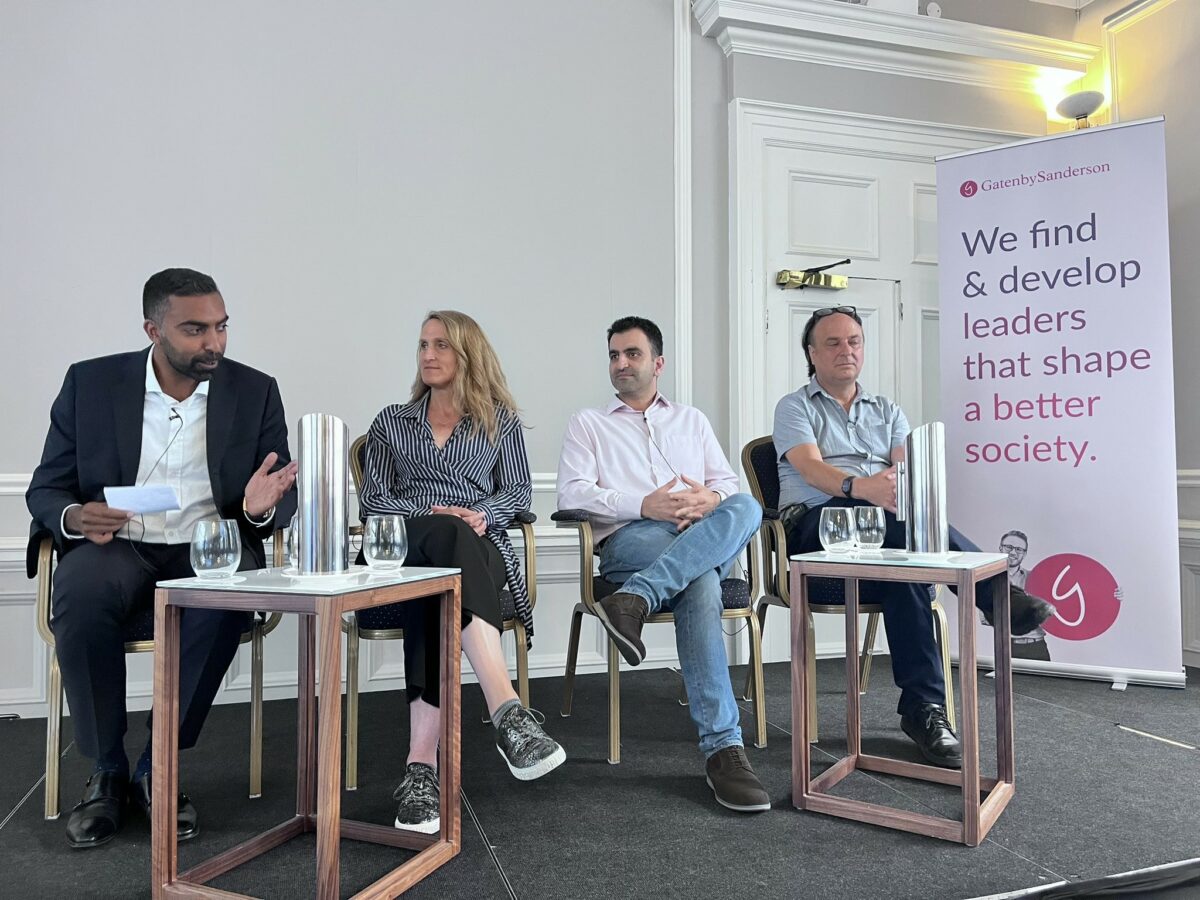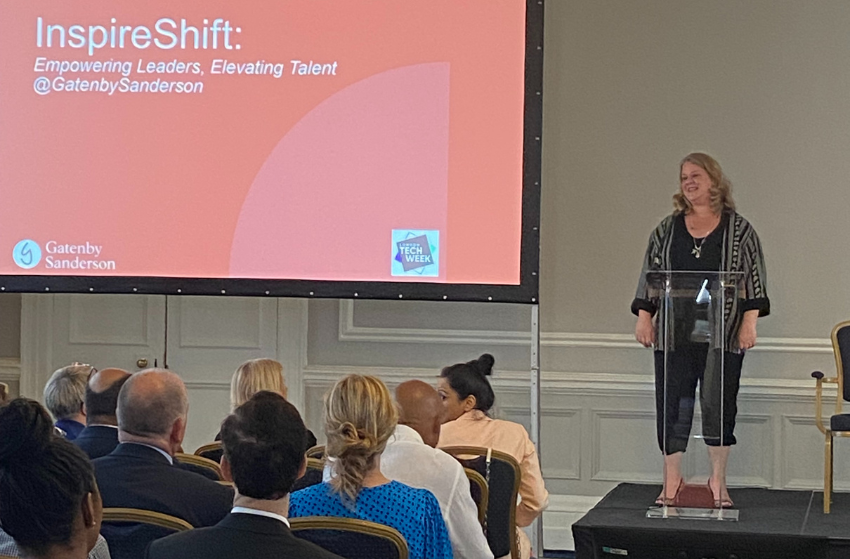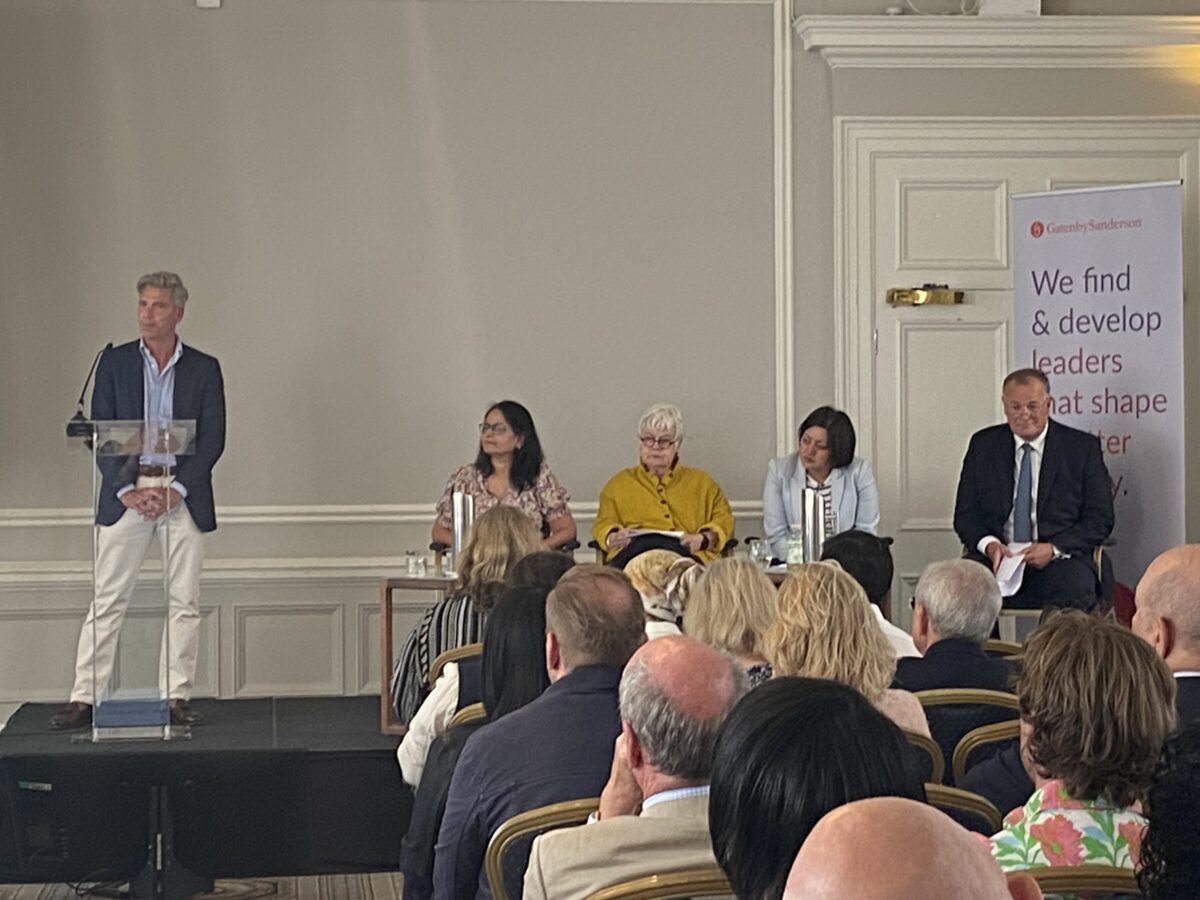- What are the biggest challenges facing public sector leaders right now?
- How is, and will, AI impact the way we work and the services we offer? And how do we use innovative technology responsibly?
- What are the learnings we still need to remember and reflect on from the pandemic?
- What makes a great leader and how can you draw upon the right skills, behaviours and attitudes to lead through current challenges?
- How can you navigate and adapt your leadership to predictable and unpredictable challenges?
These were just some of the many questions we asked, discussed and answered during our inaugural #InspireShift event as part of London Tech Week 2023. Below are our some of the key leadership learnings we took from the two panel discussions.
Panel 1: The promise and perils of AI

Hosted by: Shoaib Haroon, Principal Consultant, Digital, Data & Technology at GatenbySanderson
Panelists:
- Emma McGuigan, Senior Managing Director & Lead Enterprise & Industry Technologies at Accenture
- Omid Shiraji, Consultant CIO and Strategic Advisor at London Borough of Newham
- Michael Webb, Director of Technology and Analytics at Jisc
With AI being the next emerging topic to influence how technology operates, there are many conversations being had surrounding the levels of regulation that will be needed to keep people safe.
Emma said that regulation within AI will need to be made visible and clear by companies in order to build trust with the public. A top-down approach is needed to show there is control, but we also risk overregulation to where access for different groups of people is limited. For example, we can be restricting how we develop vaccines so it will probably be best to have a consultative approach for each space. AI can also help leverage data strategies and unlock the value of single data view access across organisations that have historically had separate technology systems.
Omid believes the government should approach AI with a more evolutionary mindset rather than a regulation one. The fear of job security in the local government sector is far from what people should worry about as they are so far behind in modernising the way tech is utilised. AI has the potential to automize processes, the way BT has recently done, but local governments are more complex and reluctant to spend millions of pounds in doing so when budgets are already squeezed. Most boroughs in London don’t even have a data strategy in place let alone introduce the new concept of AI.
Michael Webb said that instead of banning the use of ChatGPT within the education system, it is far better to educate students and give them the skills to use it correctly to enhance their learning. Quality of access can become a problem. He shared how you can get better chatgpt access for £20/month and this can risk educational inequality, with many unable to access the better tech, further driving this divide. He feels tackling this inequality is a more pressing concern for the education sector than safeguarding as big tech organisations are already working on safeguarding their AI services at the core.
Hear more about Omid’s takeaways from the #InspireShift event:
Panel 2: From Crisis to Opportunity: The Pandemic 3 years on
Hosted by: Nick Largent, Senior Consultant, Digital, Data & Technology at GatenbySanderson
Panelists:
- Priya Javeri, Executive Director of Digital, Data & Technology Services at Seetec
- Professor Mary Stiasny OBE BSc MA(Ed) PhD, Pro-Vice Chancellor (International) and Chief Executive, International Programmes at University of London
- Rokhsana Fiaz OBE, Mayor of Newham
- Stephen Watson QPM, Chief Constable at Greater Manchester Police
Rokhsana shared how Newham had some of the highest rates of mortality in the country, the psychological impact on 375k people was staggering. Average household income was £19,400/annum pre-covid when the London average was £29,000/ annum. This in combination with the current cost of living crisis amplifies the inequality in the region. Covid accelerated growth and allowed the government to tackle social determinants of poverty including quality of homes, overcrowding and intergenerational setups. This has changed the way homes are now designed and the work done around green spaces. Critical frontline teams also need to be better supported, especially helping them with their emotional resilience and that requires an adaptive and hypervigilant leader.
Mary told us about how although online education continued during lockdown and having been remote prior helped with that transition, many teaching centres closed – vital spaces for students who need somewhere away from home to work and where community and connection are fostered. Half of the students are women and many with caring responsibilities which exacerbated the impact of these closures. Lots of students lost their social interactions during a critical time in their development and we can only begin to predict the effects of this. Leaders and organisations need to be able to be adaptable and have systems that enable the systems in times of tribulation. Mary went into the office during lockdown to show the staff that had to be there they are not alone and said we need more of that as leaders.
Stephen talked openly about how the pandemic was a difficult time and how they had to protect their people on the front line when that was extremely difficult, especially as policing is a high-contact role. The best they could do was set up PPE measures and limit cross-contamination – a massive challenge. On top of that was the challenge of enforcing new and constantly changing regulations without losing the support and consent of the public. Police officers needed to keep abreast of novel legislation and help in ensuring we didn’t turn into a weird totalitarian state. Stephen found this quite an interesting challenge, however, Covid has allowed Greater Manchester Police to upgrade their tech systems and allow for more remote working which would not have been done anytime soon otherwise. He noted that he’d seen productivity plateau and how tech now needs to be leveraged to ensure that increases. His parting words were to “keep that good neighbourly spirit alive – help one another and go that extra mile the same way we did during lockdown”.
Priya told us that apart from the initial challenges of rolling out technology for staff to use at home, she realised the more pressing concern as we went into lockdown was that some of her staff were facing unsafe home environments due to reasons such as domestic violence. She covid-safe created pods in libraries to allow people to leave their homes. She acknowledged that many people struggled with their mental health too, and that being a leader means having empathy to different struggles people face and accommodating them. Allowing flexibility was and still is huge. Her key takeaway is that Covid has expedited tech to be more supportive and it has helped not lose the people part. When situations are tough, we become more creative and innovative and that helps delivery of public services.
Mary shared her reflections from the panel with us:
It was a pleasure to come together to discuss the hottest topics facing the public sector and learn, reflect, and be inspired by one another. The whole team at GatenbySanderson are truly grateful for the fantastic turnout despite the sweltering weather!
Would you like to attend our next #InspireShift event? Email us to receive an invitation once details have been confirmed.

